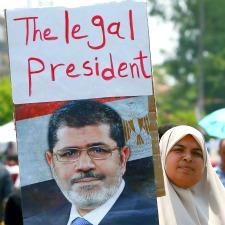BOB GARFIELD: The French term “coup d'état” translates essentially to 'strike against the state'. The military removal of Mohammed Morsi was surely that, though the Obama administration shuns the term, and the interim Egyptian leadership resolutely rejects it. Here's Egyptian Ambassador to the US, Mohamed Tawfik on ABC's This Week.
AMBASSADOR MOHAMED TAWFIK: Egypt has not undergone a military coup and it is certainly not run by the military. Today, there is an interim president in place.
[MALE REPORTER]: This is not a coup.
AMBASSADOR TAWFIK: Absolutely not.
BOB GARFIELD: After some consideration, the Associated Press determined this week that “coup” is the right word to describe what happened in Cairo. Noah Feldman, a professor of constitutional and international law at Harvard, explains why the White House simply won't say it.
NOAH FELDMAN: Congress passed a law called the Foreign Assistance Act which, as amended, says that if a duly elected president or head of state of a country is removed by a military coup or a military decree, we have to stop immediately all aid to that country, Egypt gets about 1.55 billion dollars of US aid a year. Almost all of that money goes to the Egyptian military. They’re totally dependent on our aid.
BOB GARFIELD: Yeah. And the US is totally dependent on Egypt as the guarantor of what passes for peace in the Middle East.
NOAH FELDMAN: The United States pays to assure that the Egyptian military continues to treat Israel as not exactly a friendly neighbor but at least not an enemy. And that’s been crucial to maintaining some semblance of regional stability.
BOB GARFIELD: Can we go back just one Egyptian putsch please to the unseating of Hosni Mubarak in 2011? That also was the work of the military but at the time it was not deemed by the State Department to be a coup d'état. He was a duly elected leader.
NOAH FELDMAN: In my view, he was not a duly elected leader. [LAUGHS] There certainly was an election that led to Mubarak becoming president, but it was not a democratic election in the true sense of the term.
On top of that, the Foreign Assistance Act also says that if you have a military coup, it could be suspended and then restarted, once a democratic election takes place. And in this case, there was, in fact, a democratic election and President Morsi was elected. So even if there had been some legal reason to suspend aide, there was also a reason to restart the aide again. This time it’s probable that the military in Egypt thinks that their best bet is to have a presidential election.
But, of course, they won’t allow a representative of the Muslim Brotherhood to run for office. The US government might wink and say, oh well, they’re having an election and that’s good enough for us.
BOB GARFIELD: The delicacy of semantics often figures in to diplomacy. And there’s, actually, a fairly recent precedent for this very situation. Can you tell me about Honduras?
NOAH FELDMAN: In 2009, the military of Honduras, working alongside the legislature and the Supreme Court of the country, removed President Manuel Zelaya one night. They took him out of his palace in his pajamas and deposited him in a nearby country. And the United States government struggled at first, but eventually did determine that it was a coup d’état.
I and some co-authors did an independent study of the events for the Truth and Reconciliation Commission of Honduras, and I will tell you that that was, if anything, less of a coup that what we’ve just seen it Egypt because the president had, in fact, broken the Constitution. But, of course, then the military broke the rules of the Constitution. And yet, it was counted as a coup by the US government.
BOB GARFIELD: All the handwringing about a word choice here seems to be rooted in the ambivalence. On the one hand, Morsi had kind of stacked the deck in favor of the Muslim Brotherhood. On the other hand, he was, as you say, a democratically elected president. Does the word choice have any impact on how we can resolve our ambivalence?
NOAH FELDMAN: You know, I don’t really think we should have ambivalence about this question. “Coup” is a word that has a very specific ordinary English meaning. Our government and others often doesn’t want to call things what they are. It’s the job of the media to call out the government when it’s equivocating for its own reasons.
BOB GARFIELD: If reporters do as you suggest and simply call a thing by its name, that means leaving out a whole lot of the context. Is there a shorthand way of using the C-word, while also offering some of the context that we’ve just discussed?
NOAH FELDMAN: Yeah, you could say after days of public protests weakened President Morsi, the military removed him in a coup. The government of the United States, subject to its laws, has not yet been willing to call that a coup, and may not do so at all. That’s sweet, that’s short. It’s compact. It’s accurate. And I think it provides context. But notice that it does, in fact, say the truth.
BOB GARFIELD: Noah, thank you very much.
NOAH FELDMAN: Thanks for having me.
BOB GARFIELD: Noah Feldman is a professor of constitutional and international law at Harvard Law School and a columnist for Bloomberg View.
[MUSIC UP AND UNDER]
